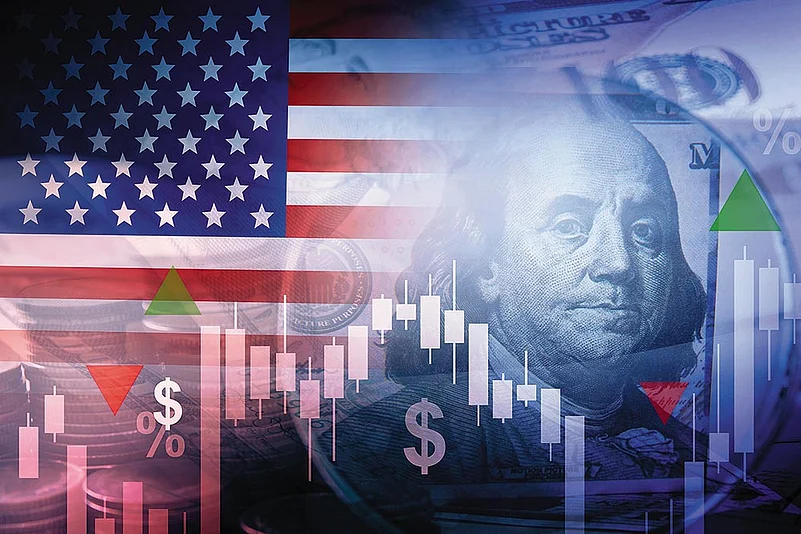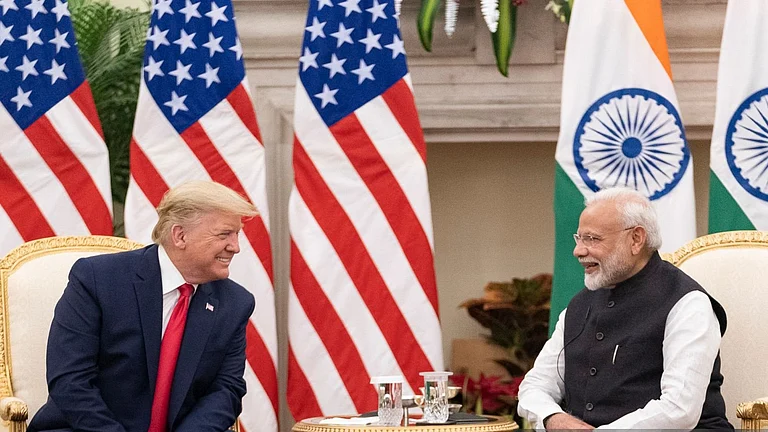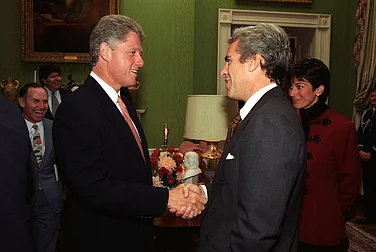This story was published as part of Outlook's 11 November, 2024 magazine issue titled 'Whitewash'. To read more stories from the issue, click here
Democratic presidential candidate Kamala Harris and her Republican rival Donald Trump are like chalk and cheese. Much has been made of the personality differences between the brash and unpredictable Trump and the more cool, calm and cerebral Harris. Nowhere do their differences stand out more than in their sharply contrasting plans for the US economy.
Former President Trump trumpeted his anti-globalisation credentials during his 2017-2021 presidency, imposing tariffs with a flourish—targeting imported aluminium, steel, electronics and practically everything from China. Trump has now proposed an across-the-board tariff of up to 20 per cent on imports, plus 60 per cent on China, while cocking a snook at India as the “biggest (tariff) charger of all”.
“I think they (India) probably charge more than, in many ways, China. But they do it with a smile,” Trump told members of the Detroit Economic Club.
Tariff Man
Unfortunately, Trump’s protectionist policies will only antagonise countries and undermine US international competitiveness. It will certainly impact Indian exports to the US, which included 7,753 commodities last year. America was India’s largest trading partner, with a record $128.78 billion in bilateral trade in 2022-2023, according to the Ministry of Commerce and Industry. India had a trade surplus of $28.30 billion with the US, with India exporting $78.54 billion to the US and America exporting $50.24 billion.
“Trump has positioned himself as an ‘America First’ protectionist, and tariffs will surely rise, further stoking inflation,” says Parag Khanna, author of The Future is Asian and CEO of AlphaGeo.
“Trump has positioned himself as an ‘America First’ protectionist, and tariffs will surely rise, further stoking inflation,” says Parag Khanna, author of The Future is Asian.
“At the same time, his objective to cut the trade deficit with China will gradually succeed despite the continued highs in imports from China simply because the US is now trading more with Mexico (and Canada) than it is with China,” he adds. “If Trump or Harris continues the pattern of deeper regional cooperation within North America, it will ultimately benefit the US tremendously.”
Trump’s steep taxes on foreign goods will provoke retaliatory tariffs, shaving over a percentage point off the US economy by 2026, noted the Peterson Institute for International Economics, and it will make inflation two percentage points higher in the US next year. Meanwhile, investment bank UBS says a 10 per cent tariff could lead to a 10 per cent contraction in the US stock market.
The America First approach also reduces US foreign economic influence, which is a “long-standing component of US global power,” says the Carnegie Endowment for International Peace. Ultimately, US power flows from the presence of US firms and capital in every nook and cranny of the world and the promise of access to US markets.
Trump is using tariffs to burnish his economic street cred with the Rust Belt battleground states of Michigan, Ohio, Wisconsin and Pennsylvania, which have haemorrhaged US manufacturing jobs to countries like China. The hard truth is that nothing is going to bring those jobs back to America, least of all tariffs. Despite Trump’s 2018 taxes on imported steel, for example, jobs in US steel plants didn’t grow a smidge.
Trade analysts across the political spectrum agree that when US companies pass the cost of the tariffs to US consumers, prices will shoot up. Harris is correct in describing Trump’s tariffs as “a sales tax on the American people”.
“Trump’s overall economic agenda is superior to Kamala Harris’ model of tax, spend, mandate and regulate,” notes The Wall Street Journal (WSJ). “But his tariff agenda is an anti-growth wild card that poses considerable economic risk in a second term.”
Pocketbook Issues
There’s enough to like in Trump’s pro-growth economic agenda focused on low taxes, low regulations, low energy costs and lower interest rates. Trump plans to bring back all the tax cuts he signed in 2017 and make permanent several elements of the Tax Cuts and Jobs Act, which lowered US tax rates for individuals and businesses. If re-elected, he also plans to bring back the deduction for state and local taxes (SALT).
“Trump understands pocketbook issues and people felt richer when he was in the White House. His proposed corporate tax cut will galvanise growth and jobs,” says a top executive, who didn’t want to be named. Trump’s plan would reduce the US corporate tax rate from 21 per cent to 15 per cent, extend individual tax cuts and eliminate taxes on Social Security benefits.
He has also promised to “liberate” the economy from regulation and install Tesla CEO Elon Musk as the head of a new “efficiency commission” to run a “complete financial and performance audit of the entire federal government”. Naturally, there’s outrage that Musk, who holds billions in federal contracts, may end up with a ridiculous amount of power to recommend sweeping cuts in federal agencies, while tweaking federal rules if Trump wins. It’s no secret that Musk, the world’s richest man with a net worth of $277 billion, has given $75 million to the political action committee he formed to support Trump.
It’s Not Bidenomics
Republicans have tried to paint Harris as a socialist like President Joe Biden, but that couldn’t be further from the truth. While Harris does embrace Democrat pet themes like government intervention to help the middle class, she is also pro-growth. She has had deep ties to her home state of California and Silicon Valley from the time she was Attorney General and Senator of California.
A Harris administration could see a shift towards Big Tech from the hostile attitude of Biden’s White House. Biden unleashed Lina M Khan, Chair of the Federal Trade Commission, on Big Tech. Khan had filed lawsuits against Amazon, Google and Apple over alleged monopolistic practices. A pending case against Meta is trying to nix its ownership of Instagram and WhatsApp.
Harris has said she will create “an opportunity economy” where everyone will have a chance to succeed whether they “live in a rural area, small town or big city”.
The Harris campaign has actively courted the tech sector, and in return, the Silicon Valley has generously contributed to her record-breaking $1 billion campaign fund. The Silicon Valley played a significant role in helping Barack Obama win the White House in 2008.
Trump has stated that he wants to make the US the “crypto capital of the planet”. Harris is also expected to take a business-friendly approach to antitrust enforcement and cryptocurrency. In her speech at The Economic Club of Pittsburgh, Harris said she was committed to the US being “dominant in artificial intelligence (AI) and quantum computing, blockchain and other emerging technologies”. As a senator, her record shows a balanced stance to stabilise tech sector growth with responsible governance.
As the US elections approach, CEOs such as Aaron Levie, the co-founder of enterprise cloud company Box, are using social media to encourage voters to support Harris and her “strong pro-business, pro-tech agenda”.
Opportunity Economy
Harris has said she will create “an opportunity economy” where everyone will have a chance to succeed whether they “live in a rural area, small town or big city”. Her economic blueprint involves cutting taxes for working individuals, lowering health insurance premiums through the Affordable Care Act, expanding the child tax credit and increasing tax deductions for small businesses, while raising the corporate tax rate from 21 per cent to 28 per cent. Harris also has a significant plan to provide $25,000 in down payment assistance to first-time American homebuyers.
“It’s great that this will make it easier for people to become homeowners. However, it might also lead to a higher demand for homes, causing prices to go up,” says Quantum International CEO Hector Shortell.
Harris has pivoted from Biden’s focus on infrastructure development to everyday issues that resonate with the people. She wants to lower the cost of living by reducing food prices and housing expenses and give tax breaks for families. If elected, Harris’ grocery pricing proposal would empower the Federal Trade Commission to penalise big corporations that inflate prices.
Harris is also focused on increasing clean energy manufacturing jobs, like producing solar panels and wind turbines, that will benefit American alternative energy manufacturers.
Deficit Dilemma
What happens in America matters enormously to the global economy, so it is hard to ignore America’s budgetary dysfunction. Both Trump and Harris plan to spend heavily to fuel the nascent upswing in the US economy, but they must balance runaway debt.
According to a survey of top economists by the Financial Times and the University of Chicago, 70 per cent agree that Harris would be better on deficit than Trump, while only 11 per cent believe that Trump would be better on deficit than Harris.
Meanwhile, the WSJ agrees that Harris and Trump aren’t the same on fiscal policy. “She has outlined or endorsed enough fiscal measures—tax increases or spending cuts—to plausibly pay for much of her agenda. He has not,” said the WSJ. Harris wants to increase taxes on Americans earning more than $400,000 a year and corporate taxes.
Goldman Sachs has estimated that a Harris win would lead to 10,000 more new jobs per month than if Trump is elected in a divided government—and 30,000 more than if Trump wins and the Republicans control both the Senate and the House. It’s obvious that the global economy, US inflation rates, fiscal deficit, job and stock markets could experience significant shifts depending on the election results.
(Views expressed are personal)
MORE FROM THIS ISSUE
Uttara Choudhury is a New York-based writer and wealth management advisor
(This appeared in the print as 'US Economy: What's at Stake?')





















.png?auto=format%2Ccompress&fit=max&format=webp&w=376&dpr=2.0)








